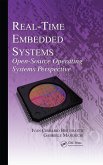Realizing Complex Integrated Systems (eBook, ePUB)
Redaktion: Ambler, Anthony P.; Sheppard, John W.
52,95 €
52,95 €
inkl. MwSt.
Erscheint vor. 20.02.25

26 °P sammeln
52,95 €
Als Download kaufen

52,95 €
inkl. MwSt.
Erscheint vor. 20.02.25

26 °P sammeln
Jetzt verschenken
Alle Infos zum eBook verschenken
52,95 €
inkl. MwSt.
Erscheint vor. 20.02.25
Alle Infos zum eBook verschenken

26 °P sammeln
Unser Service für Vorbesteller - Ihr Vorteil ohne Risiko:
Sollten wir den Preis dieses Artikels vor dem Erscheinungsdatum senken, werden wir Ihnen den Artikel bei der Auslieferung automatisch zum günstigeren Preis berechnen.
Sollten wir den Preis dieses Artikels vor dem Erscheinungsdatum senken, werden wir Ihnen den Artikel bei der Auslieferung automatisch zum günstigeren Preis berechnen.
Realizing Complex Integrated Systems (eBook, ePUB)
Redaktion: Ambler, Anthony P.; Sheppard, John W.
- Format: ePub
- Merkliste
- Auf die Merkliste
- Bewerten Bewerten
- Teilen
- Produkt teilen
- Produkterinnerung
- Produkterinnerung

Bitte loggen Sie sich zunächst in Ihr Kundenkonto ein oder registrieren Sie sich bei
bücher.de, um das eBook-Abo tolino select nutzen zu können.
Hier können Sie sich einloggen
Hier können Sie sich einloggen
Sie sind bereits eingeloggt. Klicken Sie auf 2. tolino select Abo, um fortzufahren.

Bitte loggen Sie sich zunächst in Ihr Kundenkonto ein oder registrieren Sie sich bei bücher.de, um das eBook-Abo tolino select nutzen zu können.
The creation of complex integrated systems is, in itself, complex. It requires immense planning, a large team of people with diverse backgrounds, based in dispersed geographical locations (and countries) supposedly working to a coordinated schedule and cost.
- Geräte: eReader
- mit Kopierschutz
- eBook Hilfe
- Größe: 23.94MB
Andere Kunden interessierten sich auch für
![Smart Computing and Self-Adaptive Systems (eBook, ePUB) Smart Computing and Self-Adaptive Systems (eBook, ePUB)]() Smart Computing and Self-Adaptive Systems (eBook, ePUB)48,95 €
Smart Computing and Self-Adaptive Systems (eBook, ePUB)48,95 €![Fuzzy Optimization Techniques in the Areas of Science and Management (eBook, ePUB) Fuzzy Optimization Techniques in the Areas of Science and Management (eBook, ePUB)]() Fuzzy Optimization Techniques in the Areas of Science and Management (eBook, ePUB)49,95 €
Fuzzy Optimization Techniques in the Areas of Science and Management (eBook, ePUB)49,95 €![Realizing Complex Integrated Systems (eBook, PDF) Realizing Complex Integrated Systems (eBook, PDF)]() Realizing Complex Integrated Systems (eBook, PDF)52,95 €
Realizing Complex Integrated Systems (eBook, PDF)52,95 €![Visual Perception and Control of Underwater Robots (eBook, ePUB) Visual Perception and Control of Underwater Robots (eBook, ePUB)]() Junzhi YuVisual Perception and Control of Underwater Robots (eBook, ePUB)48,95 €
Junzhi YuVisual Perception and Control of Underwater Robots (eBook, ePUB)48,95 €![Hybrid Intelligence for Smart Grid Systems (eBook, ePUB) Hybrid Intelligence for Smart Grid Systems (eBook, ePUB)]() Hybrid Intelligence for Smart Grid Systems (eBook, ePUB)48,95 €
Hybrid Intelligence for Smart Grid Systems (eBook, ePUB)48,95 €![Real-Time Embedded Systems (eBook, ePUB) Real-Time Embedded Systems (eBook, ePUB)]() Ivan Cibrario BertolottiReal-Time Embedded Systems (eBook, ePUB)80,95 €
Ivan Cibrario BertolottiReal-Time Embedded Systems (eBook, ePUB)80,95 €![Embedded Systems and Robotics with Open Source Tools (eBook, ePUB) Embedded Systems and Robotics with Open Source Tools (eBook, ePUB)]() Nilanjan DeyEmbedded Systems and Robotics with Open Source Tools (eBook, ePUB)51,95 €
Nilanjan DeyEmbedded Systems and Robotics with Open Source Tools (eBook, ePUB)51,95 €-
-
-
The creation of complex integrated systems is, in itself, complex. It requires immense planning, a large team of people with diverse backgrounds, based in dispersed geographical locations (and countries) supposedly working to a coordinated schedule and cost.
Dieser Download kann aus rechtlichen Gründen nur mit Rechnungsadresse in A, B, BG, CY, CZ, D, DK, EW, E, FIN, F, GR, HR, H, IRL, I, LT, L, LR, M, NL, PL, P, R, S, SLO, SK ausgeliefert werden.
Produktdetails
- Produktdetails
- Verlag: Taylor & Francis eBooks
- Erscheinungstermin: 20. Februar 2025
- Englisch
- ISBN-13: 9781040256077
- Artikelnr.: 72735407
- Verlag: Taylor & Francis eBooks
- Erscheinungstermin: 20. Februar 2025
- Englisch
- ISBN-13: 9781040256077
- Artikelnr.: 72735407
- Herstellerkennzeichnung Die Herstellerinformationen sind derzeit nicht verfügbar.
Anthony P. Ambler is a fellow of the IEEE, elected 'For contributions to economics of testing complex digital devices and systems'. His research interests are in test economics, system test, and diagnosis. He received his B.Sc., M.Sc., and Ph.D. from the University of Manchester Institute of Science and Technology. He was appointed to a chair in Test Technology at Brunel University (UK) and then moved to the USA. He became chairman of Electrical & Computer Engineering at the University of Texas at Austin, then dean of Engineering & Computing at the University of South Carolina, and recently as dean of Technology at the University of Houston. In addition to his research work, he created the MS degree program in Engineering Management at UT Austin. He has acted as chair of the Organizing Committee of the European Design and Test Conference, general chair and program chair of IEEE International Test Conference and of IEEE International Conference on Computer Design. He has created a number of Workshops including on Test Economics, System Test and Diagnosis, and Production Test Automation. John W. Sheppard is a Norm Asbjornson College of Engineering Distinguished Professor in the Gianforte School of Computing at Montana State University. His research interests include fault diagnosis/prognosis of complex systems, model¿based and Bayesian reasoning, explainable and ethical artificial intelligence, and distributed population¿based algorithms. He is a fellow of the IEEE, elected 'For contributions to system¿level diagnosis and prognosis'. He received his BS in computer science from Southern Methodist University and his MS and PhD in computer science from Johns Hopkins University. Before entering academia full¿time, he was a member of the industry for 20 years where his prior position was as a research fellow at ARINC Incorporated. He has been a long¿time leader in the IEEE Standards Association, chairing several working groups focused on publishing standards related to complex system test and diagnosis. Previously, he also served as the designated representative from the IEEE Computer Society to the IEEE Standards Coordinating Committee 20 on Test and Diagnosis for Electronic Systems.
1. An Overview of Complex System Design. PART 1 System Planning 2.
Requirements Types - Design and Test. 3. Project Planning. 4. System
Decomposition. 5. Systems Engineering Vee. 6. Economics of Design and Test.
7. Cyber-Physical Systems. 8. Logistics and Supply Chain Management. PART 2
System Design 9. Chip Level Design and Test. 10. Board-Level Design and
Test. 11. Power Distribution. 12. Design Patterns and Reusability. 13.
Test-Driven Development. PART 3 System Analysis 14. Reliability. 15.
Availability. 16. Maintainability. 17. Performance Evaluation. 18.
Optimizing Complex Systems Operation. PART 4 System Testing 19. Types of
Testing. 20. Software Text. 21. Error Handling. 22. Automated Test Systems
Design. 23. Interoperability. PART 5 System Health 24.Uncertainty and
Uncertainty Propagation. 25. Fault Detection, Localization, and Isolation.
26. Risk and Risk Analysis. 27. Risk-Based Prognostics and Health
Management. 28. Structural Health Monitoring. PART 6 System Security 29.
Risk Management Framework. 30. Information Assurance, Vulnerability
Analysis, and Remediation. 31. Cryptographic Systems. 32. Software
Security. PART 7 System Usage 33. Human Systems Interaction - Interface
Design. 34. Human and Privacy Rights. 35. Humanitarian Well-Being. 36. The
Social Impacts of Complex Systems.
Requirements Types - Design and Test. 3. Project Planning. 4. System
Decomposition. 5. Systems Engineering Vee. 6. Economics of Design and Test.
7. Cyber-Physical Systems. 8. Logistics and Supply Chain Management. PART 2
System Design 9. Chip Level Design and Test. 10. Board-Level Design and
Test. 11. Power Distribution. 12. Design Patterns and Reusability. 13.
Test-Driven Development. PART 3 System Analysis 14. Reliability. 15.
Availability. 16. Maintainability. 17. Performance Evaluation. 18.
Optimizing Complex Systems Operation. PART 4 System Testing 19. Types of
Testing. 20. Software Text. 21. Error Handling. 22. Automated Test Systems
Design. 23. Interoperability. PART 5 System Health 24.Uncertainty and
Uncertainty Propagation. 25. Fault Detection, Localization, and Isolation.
26. Risk and Risk Analysis. 27. Risk-Based Prognostics and Health
Management. 28. Structural Health Monitoring. PART 6 System Security 29.
Risk Management Framework. 30. Information Assurance, Vulnerability
Analysis, and Remediation. 31. Cryptographic Systems. 32. Software
Security. PART 7 System Usage 33. Human Systems Interaction - Interface
Design. 34. Human and Privacy Rights. 35. Humanitarian Well-Being. 36. The
Social Impacts of Complex Systems.
1. An Overview of Complex System Design. PART 1 System Planning 2.
Requirements Types - Design and Test. 3. Project Planning. 4. System
Decomposition. 5. Systems Engineering Vee. 6. Economics of Design and Test.
7. Cyber-Physical Systems. 8. Logistics and Supply Chain Management. PART 2
System Design 9. Chip Level Design and Test. 10. Board-Level Design and
Test. 11. Power Distribution. 12. Design Patterns and Reusability. 13.
Test-Driven Development. PART 3 System Analysis 14. Reliability. 15.
Availability. 16. Maintainability. 17. Performance Evaluation. 18.
Optimizing Complex Systems Operation. PART 4 System Testing 19. Types of
Testing. 20. Software Text. 21. Error Handling. 22. Automated Test Systems
Design. 23. Interoperability. PART 5 System Health 24.Uncertainty and
Uncertainty Propagation. 25. Fault Detection, Localization, and Isolation.
26. Risk and Risk Analysis. 27. Risk-Based Prognostics and Health
Management. 28. Structural Health Monitoring. PART 6 System Security 29.
Risk Management Framework. 30. Information Assurance, Vulnerability
Analysis, and Remediation. 31. Cryptographic Systems. 32. Software
Security. PART 7 System Usage 33. Human Systems Interaction - Interface
Design. 34. Human and Privacy Rights. 35. Humanitarian Well-Being. 36. The
Social Impacts of Complex Systems.
Requirements Types - Design and Test. 3. Project Planning. 4. System
Decomposition. 5. Systems Engineering Vee. 6. Economics of Design and Test.
7. Cyber-Physical Systems. 8. Logistics and Supply Chain Management. PART 2
System Design 9. Chip Level Design and Test. 10. Board-Level Design and
Test. 11. Power Distribution. 12. Design Patterns and Reusability. 13.
Test-Driven Development. PART 3 System Analysis 14. Reliability. 15.
Availability. 16. Maintainability. 17. Performance Evaluation. 18.
Optimizing Complex Systems Operation. PART 4 System Testing 19. Types of
Testing. 20. Software Text. 21. Error Handling. 22. Automated Test Systems
Design. 23. Interoperability. PART 5 System Health 24.Uncertainty and
Uncertainty Propagation. 25. Fault Detection, Localization, and Isolation.
26. Risk and Risk Analysis. 27. Risk-Based Prognostics and Health
Management. 28. Structural Health Monitoring. PART 6 System Security 29.
Risk Management Framework. 30. Information Assurance, Vulnerability
Analysis, and Remediation. 31. Cryptographic Systems. 32. Software
Security. PART 7 System Usage 33. Human Systems Interaction - Interface
Design. 34. Human and Privacy Rights. 35. Humanitarian Well-Being. 36. The
Social Impacts of Complex Systems.







